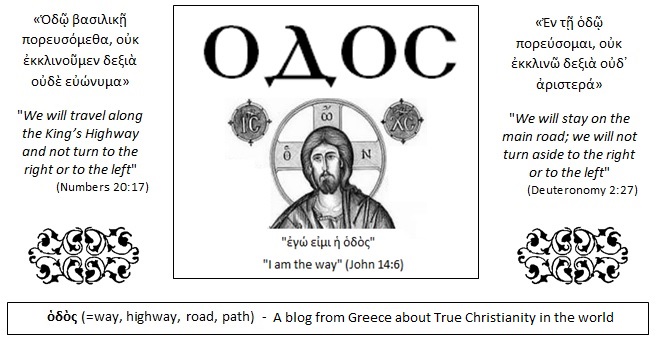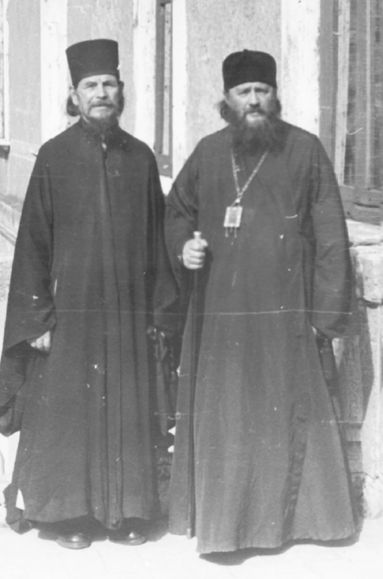Archbishop Leonty (+1971) and the Greek Old Calendarists [part 11]
(Continue from here)
In January 1963, after sending to Greece the ordination certificates of Bishops Auxentius of Gardikion and Chrysostomos of Magnesia, Archbishop Leonty wrote to Bishop Petros regarding the reaction of ROCOR to the new ordinations. [1]
Specifically, during a regular session of ROCOR on January 19 (O.S.), a complaint was submitted by Fr. Anthony Grabbe (the son of Fr. George), according to which Archbishop Leonty secretly ordained Petros and Akakios (Douskos) and allegedly received $5,000 to travel to Jerusalem. A letter was sent to Archbishop Leonty regarding the matter, to which he responded appropriately, refuting the slander; he attached his letter addressed to Bishop Petros to his response.
In this letter, without directly revealing his involvement in these ordinations (so as not to provoke his superior authority), he states clearly that, in a time when the Orthodox Church is being persecuted, whether it be Russian or Greek, he will always stand on the righteous side and do everything to assist Orthodoxy. He also wonders why ROCOR insists on aligning with its enemies and does not support the True Orthodox.
At the regular session of ROCOR on February 6 (O.S.), it was decided not to permit the presence of Archbishops Leonty of Chile and Seraphim of Chicago (due to their involvement in the ordinations of the Old Calendarists) at the next Synod. However, at the regular session of ROCOR on April 12 (O.S.), it was announced that the investigation into these ordinations was being terminated due to a lack of evidence, and it was declared that neither the First Hierarch nor the Synod of Bishops of ROCOR bore any responsibility for them.
Commenting on the above, Archbishop Leonty wrote to the Synod of the G.O.C. on Pascha in 1963, stating that although the Synod of ROCOR does not wish to have relations with the Greek Old Calendarists, under the pretext that they do not want to interfere in the internal affairs of another Church, they nevertheless accepted certain Bulgarian parishes into their jurisdiction with the justification that their Patriarch is aligned with communist Moscow—as if the Greek New Calendarists are not aligned with it as well!
Archbishop Leonty, both in the aforementioned Paschal letter to the Synod of the G.O.C. and in a congratulatory letter to the leaders responsible for the P.T.E.O.K., Konstantinos Komnios and Konstantinos Sideris, emphasizes the necessity of the unity of the True Orthodox, which, together and primarily with adherence to the Truth of the Faith, leads to the progress of the Church, even if the whole world stands against it. Expressing with love and great nostalgia that, although a year has passed since his visit to Greece, "I vividly remember everyone and everything as if it all happened just yesterday," he demonstrates that the great and wondrous event of the ordinations he performed left an indelible mark on his soul, a testament to the heartfelt unity of the True Orthodox, even though they are literally on opposite sides of the earth from one another!
Additionally, he highlights that "we must hold our banner high without enclosing ourselves in our own shell alone." This perspective of his was evident from the outset, and in a letter dated April 8, 1963, Fr. George of Provata points out the following significant remarks regarding the difference in perspective between Archbishop Leonty and the Synod of the G.O.C.: "The opposition of His Eminence Leonty, I believe, lies in a difference of principles. [His Eminence Leonty] desires the course of the Holy Struggle to be militant, as opposed to our maintained conservative approach." [3] He then continues revealingly: "Amidst the turmoil he encountered during his visit there, the contradictions, his ignorance of the Greek language, and his hurried departure, he was unable to comprehend the reality of the conditions here, and consequently, the various reports made to him were influenced by the perspectives and objectives of the informants. He certainly does not conceive of the great and complex problem of the lack of suitable candidates for the priesthood. In any case, in a letter to Father Achillios, he advocates for the right of veto; I do not know whether such commitments have been undertaken by our hierarchs."
Indeed, the letters reaching Archbishop Leonty now begin to reveal that the divisions among the Old Calendarists not only persisted but were gradually increasing. However, because his person was respected by all, they sought to appeal to him, attempting to draw him to their own opinions and to request his intervention in their favor. Yet Archbishop Leonty, as far as his information allows, remains always impartial and continually issues exhortations for brotherly cooperation. In a letter to the P.T.E.O.K., he expresses his joy for the progress of the Church and his desire to be in Greece.
During the same period (May 1963), the hierarchy of the official (New Calendarist) Church of Greece dealt with the issue of the ordinations of the Old Calendarists, as we read in relevant publications of the time. It is very important to note that the Church of Greece characterizes the ordinations of the Old Calendarists as "Canonical":
Meanwhile, in March of the same year, Archbishop Leonty received a letter from Bishop Akakios of Diavleia, who attempted to explain the Synod's negative stance toward Petros of Astoria. In August, he received a letter from Fr. Chrysostomos Kiousis, who, after expressing his gratitude to Archbishop Leonty for remembering him, voiced complaints about being sidelined, as he had still not been ordained a bishop.
In July, in a letter to the clergy and laity of the Church of the True Orthodox in Greece, Archbishop Leonty attacks those who oppose Bishop Petros.
Letter of support to Bishop Peter of Astoria from the ROCOR's Bishops. First signed (in Greek) by St. John Maximovich (Ιωάννης Αρχιερεύς=John the Archpriest)
Also, for the first time, he begins to consider that perhaps it was a mistake to proceed with the ordination of certain individuals, although his intention was pure and "everything was done for the glory of the Most High and for the good of the Church."
Indeed, there have been many instances in which holy bishops, with good intentions, have made mistakes in selecting individuals for ordination. Classic examples from Church history include the ordination of Maximus the Cynic as a priest by Saint Gregory the Theologian, the ordination of Meletios Smotrytsky [4] by Theophanes of Jerusalem, and the ordination of Matthew Karpathakis as a bishop by Saint Chrysostomos, the former Metropolitan of Florina. [5]
It is also worth noting that on July 31, the Holy Synod of the G.O.C., in a new letter to Archbishop Leonty, [6] reiterated for the third time that it regards him as its head, elder brother, and corresponding member.
APPENDIX
Excerpts from a letter by Archbishop Leonty to the Zealot Monks of Mount Athos (Dec. 28, 1963, O.S.):
"Great joy was brought to me by your brotherly letter with the good news and the beautiful photographs of your brethren. May our Lord Jesus Christ protect you. I am very pleased that you have not forgotten me.
"I pity the Matthewites, who are unaware of their error and remain in their delusion, yet claim to uphold the exactness and justice of God. I am deeply saddened. Perhaps one day they will come to recognize their error and acknowledge the truth of God.
"Regarding the issue of the Pope's council, [7] this is not of great significance, for in all his conferences, the Pope transgresses the law of God and even more so tramples upon the foundations of the faith to satisfy the faithless world…
"...If the Pope and all the Latin-minded do not return to Orthodoxy, that is, to how it was before the division of the Church, [8] nothing will come of it, and all of this will vanish with a bang, [9] like dust blown away by the wind. However, since the world now wishes to live without Christ, there is no hope in them. Christ, our Savior, when He comes to judge humanity, will He ‘find faith on the earth?’ [10]
"Hold firmly to Orthodoxy. May you all be loving and united in your thoughts and minds.
"The Hierarchical Synod intended to send me to Rome to shepherd our Churches there. In that case, I would have been near you. However, the Pope declared (not officially, but through the Italian Government) that he does not permit a Russian Orthodox bishop to reside permanently in Rome.
"Write to me with details about life on Mount Athos and your own. Pray for me, that our Lord may help us to trample upon every action of the enemies of the Orthodox Church, for the zealots of the faith are few compared to the modernists and innovators.
"The meeting of Patriarch Athenagoras with the Pope [11] caused great uproar and concern among Orthodox Christians. May you be healthy and protected by God."
NOTES
[1] On January 30 (O.S.), 1963 (Arhive of Bishop Peter of Astoria).
[2] In the regular sessions of ROCOR, the Metropolitan and three bishops participated. Conversely, in the regular Synods, which took place every two or three years, all the bishops participated.
[3] Archive of Konstantinos Komnios.
[4] A spiritual disciple of the Martyr Patriarch Cyril Loukaris (who gave him the monastic name Meletios in honor of his own spiritual father, Saint Meletios Pegas), Smotrytsky, from being a defender of Orthodoxy, ultimately ended up joining the accursed Unia.
[5] "When the former Metropolitan of Florina, Chrysostomos, visited him in his cell, he reproached him for the ordination of Matthew Karpathakis as a bishop... To the words of Elder Michael, Chrysostomos of Florina replied: ''Lord, do not hold this sin." (Moses, Monk of Mount Athos, The Elder Michael the Blind, Thessaloniki, 1988, p. 43).
[6] It was not found, but we know its summary from the Protocol Book of the Synod.
[7] The Second Vatican Council [1962-1965].
[8] Archbishop Leonty (like all true Orthodox, in contrast to the heretical Ecumenists) upheld, in agreement with the Fathers, that with the division of the Church in 1054, the Western Church fell into schism and heresy and became spiritually dead, while the Eastern Church remained the One, Holy, Catholic, and Apostolic Church of Christ.
[9] Cf. Psalm 9:7 ("his memory perished with a loud noise").
[10] Luke 18:8.
[11] The meeting took place in the Holy Land on January 5, 1964 (that is, on December 23 according to the Old Calendar, five days before the drafting of this letter).
[Be continued]









Σχόλια
Δημοσίευση σχολίου